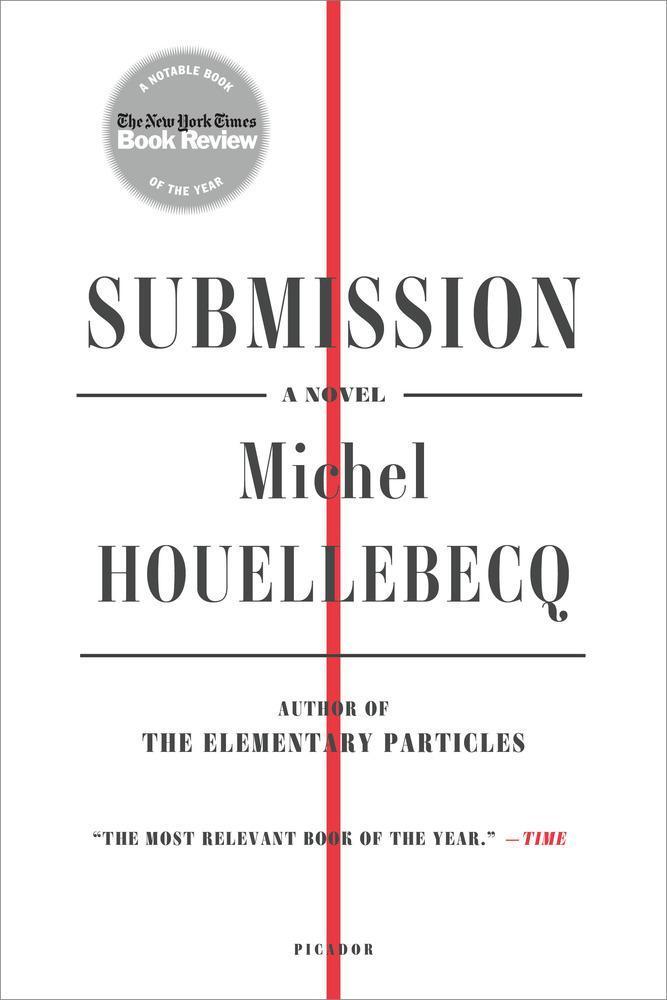‘Submission’ by Michel Houellebecq
William Armstrong - william.armstrong@hdn.com.tr

Chinese tourists take pictures as French army soldiers patrol near the Arc de triomphe in Paris, in this picture taken on June 13, 2016. REUTERS photo
‘Submission’ by Michel Houellebecq (Picador, 256 pages, Farrar, Straus and Giroux)
A confession: Before actually reading this book I had a dismissive paragraph in mind for the review. I was ready to criticize “Submission” for being neither as brilliant nor as scandalous as the headlines suggest. Unfortunately I can’t use that paragraph. Michel Houellebecq’s satirical novel about France becoming an Islamic state is actually a clever, often very funny read. It is also more subtle than you might expect.

The novel is narrated by François, a 44-year-old professor at the Sorbonne interested in little more than food, alcohol and sex. The year is 2022, and French politics has become increasingly bitter and rudderless, with a sense building that “the widening gap, now a chasm, between the people and those who claimed to speak for them, the politicians and journalists, would necessarily lead to something violent and unpredictable.”
In the first round of presidential elections, the far-right Front National wins with a third of the vote, followed by the Socialists and a fictional French Muslim Brotherhood with a fifth each. Faced with the prospect of a Front National victory, the Socialists crumble and it is the Muslim Brotherhood’s shrewd and charismatic leader Mohammed Ben Abbes who emerges as the most plausible consensus candidate. In the second round of voting, in an increasingly chaotic and turbulent society on the verge of civil war, Ben Abbes wins easily.
Thus dies French secularism. Upon the Islamists taking power, women are forced to wear the headscarf, polygamy becomes the norm, and Morocco and Tunisia join the EU. Unemployment is solved by women being forced out of the workforce and the national deficit is eradicated through cuts to education (funded by Saudi Arabia). With its renewed sense of purpose, France is restored to a position of global power and the French language is rehabilitated from its marginal position on the world’s stage. Muslim Brotherhood governance provides a “historic opportunity for the moral and familial rearmament of Europe.”
After the regime change François loses his job at the new “Islamic University of the Sorbonne.” He is an expert on the late 19th century novelist Joris-Karl Huysmans - a specialism overloaded with symbolism. In later life, Huysmans went on a spiritual odyssey from the fin de siècle decadence of his novel “A rebours” (Against Nature) back to the Roman Catholic faith of his childhood. At one point in “Submission,” Francois, worried about civil unrest, similarly flees Paris for a Catholic pilgrimage to the Sanctuary of the Virgin at Rocamadour in southwest France. But it leaves him cold and he soon returns to Paris, where he is given a tempting career offer at his old university if he agrees to convert to Islam.
The object of Houellebecq’s satirical scorn is France itself, rather than Islam. The religion is effectively used as a convenient device to reveal the corruption of French society.
As Adam Gopnik has written in the New Yorker, Houellebecq is “not so much an Islamophobic critic of Islam, but rather a reactionary critic of liberalism.” France is so decadent and compromised – a “body without a soul – a zombie” - that an Islamic takeover is exactly what it deserves. A rudderless political establishment is no match for a peaceful Islamist party run by those who believe in something bigger and grander than the self.
“Submission” is sometimes heavy-handed, but it is often also very funny, full of amusing one-liners. Francois observes at one point that he is going to die “fast, unhappy and alone. And did I really want to die fast, unhappy and alone? In the end, only kind of.” Perusing a brochure from a Parisian brothel of the 19th century, he wonders: “Certain sexual practices had vanished from human memory, in one century – not unlike certain forms of skilled labor, such as cobbling or bell-ringing. How could anyone argue that Europe wasn’t in decline?”
Such jokes lighten the gloom. As satire often does, "Submission" takes a trend pointing in one direction and imagines: “What if it doesn’t stop?” The novel project's today’s anxieties onto the future. As with George Orwell’s 1984, less sophisticated readers see it as an ominous prediction, when it is actually a biting critique of the present.
* Follow the Turkey Book Talk podcast via Twitter here, iTunes here, Stitcher here, Podbean here, or Facebook here.

 The novel is narrated by François, a 44-year-old professor at the Sorbonne interested in little more than food, alcohol and sex. The year is 2022, and French politics has become increasingly bitter and rudderless, with a sense building that “the widening gap, now a chasm, between the people and those who claimed to speak for them, the politicians and journalists, would necessarily lead to something violent and unpredictable.”
The novel is narrated by François, a 44-year-old professor at the Sorbonne interested in little more than food, alcohol and sex. The year is 2022, and French politics has become increasingly bitter and rudderless, with a sense building that “the widening gap, now a chasm, between the people and those who claimed to speak for them, the politicians and journalists, would necessarily lead to something violent and unpredictable.”